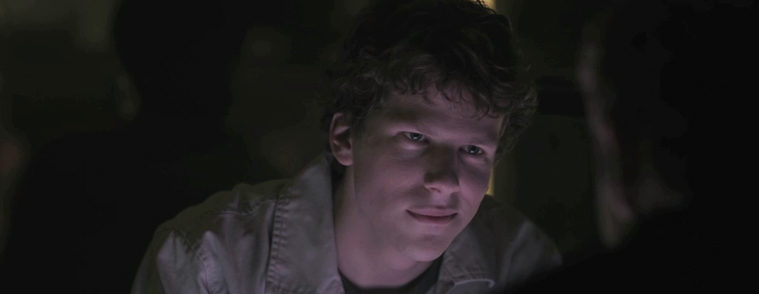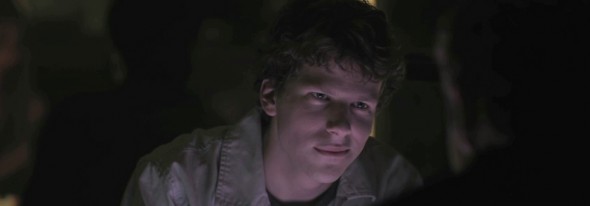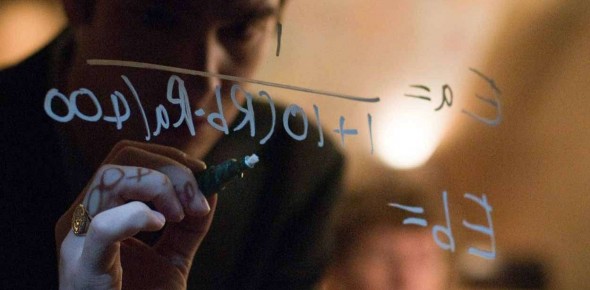No other director (David Fincher) and writer (Aaron Sorkin) could’ve captured the story of Facebook with such impulse, tension and constant captivation. Using Sorkin’s razor-sharp script as a template, Fincher explores the fascinating beginnings of the site that has defined our generation. Elevating far beyond just “the story of Facebook,” the duo examine obsession, friendship and the need for acceptance. While it doesn’t have the immediate emotional impact I expected, there are rich themes and ideas permeating every scene, urging an inner-reflection of our current society.
Jesse Eisenberg is pitch-perfect as Mark Zuckerberg. His entire personality is laid out in the first scene: a break-up with Rooney Mara‘s character, which preps us for the breakneck pacing of Sorkin’s script. That same night, Zuckerberg launches the idea that will lead to what more than 500 million of us use nearly every day. In one of the most flawlessly-orchestrated scenes put on film – or memory cards in Fincher’s case – editors Kirk Baxter and Angus Wall construct a virtuoso contrast anchored by Trent Reznor and Atticus Ross’ pulsating score. On one spectrum we see the loner Zuckerberg navigate through Apache and MySQL, as the geek inside me couldn’t believe how precisely Fincher nailed it. On the other side, the college girls that Zuckerberg is about to expose are recklessly partying at the exclusive fraternity on campus. It is an exuberant whirlwind of a scene that is hard for the rest of the film to match.
Fincher keeps nearly the same furious pace as we flawlessly weave in and out of multiple lawsuit depositions telling the back story. One is between Zuckerberg and his once-best friend Eduardo Saverin (Andrew Garfield), who is pushed out of what he believes is his rightful Facebook ownership. The other is between Divya Narendra (Max Minghella) and the Winklevoss twins over stealing the initial idea. Fincher used face-mapping technology to project Armie Hammer‘s face on Joshua Pence, in effect creating identical twins.
Commenting on our generation’s need for instant gratification, Fincher rips through the script like a madman. There is rarely a wasted breath throughout the entire runtime. A sentence in one deposition will be finished as we cut into the subsequent backstory. Every camera move is precisely calculated to move the barreling tale along. With each passing second, Fincher is simply working a step above us all, constantly proving his worth as auteur of studio proportions.
It’s fascinating to see how the “relationship status” or the photo-sharing on Facebook came about, but Sorkin’s script is searching for something deeper. As Zuckerberg loses friends and creates enemies, this driven pioneer speaks volumes on passion and dedication at all costs. With Sorkin giving weight to each side of the story, Zuckerberg’s character isn’t portrayed as the one-sided asshole one might expect. He may be the youngest billionaire in history, but, in the end, there is a certain unexpected sympathy conveyed for the longing loner.
Although our site here is less than a peon compared to Facebook, I couldn’t help but relate to some of the other themes Fincher explores. Sean Parker (Justin Timberlake) explains to Zuckerberg that “this is our time” and that we can create ideas to build on instead of relying on upper-class, middled-aged businessmen. Regardless of the portrayal of the characters, this is a film about pushing forward at all costs.
Just as Fight Club captured the zeitgeist of the time, The Social Network personifies the fast-paced, free-flowing information network of this generation. Fincher’s technical prowess is unmatched as he brings to life the real hero of the film, Sorkin’s meticulously engineered script. Those that think this is just a by-the-numbers story of Facebook will be gravely mistaken as Fincher’s friend request is one worth accepting.
Will you see The Social Network? How has Facebook changed your life?



